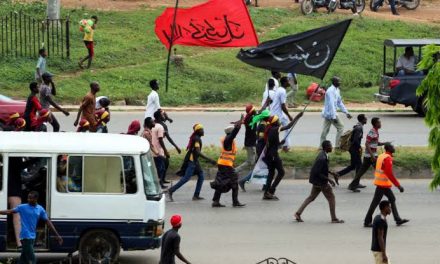Nigerian lawyer argues why Funke Akindele and JJC Skillz’s conviction cannot stand in law

A Nigerian lawyer has explained why Funke Akindele and JJC Skillz’s conviction for violating a lockdown order issued by the Lagos state government, cannot stand in law.
Recall that we reported earlier that the couple were handed a fine of N100,000 each and also sentenced to 14 days community service, three hours per day excluding Saturday and Sunday.
Constitutional Lawyer, Inibehe Effiong who reacted to the development pointed out the flaws in the law which aided the conviction.
He wrote;
Why The Conviction Of Funke Akindele Cannot Stand In Law
INTRODUCTION:
The trial and conviction of actress Funke Akindele and her husband is legally flawed. The fact that they pleaded guilty does not foreclose a discussion on the case because the flaws that I intend to highlight are constitutional and jurisdictional in nature. Issues of jurisdiction can be raised at any time.
I have read the following: The Charge Sheet filed by the office of the Attorney General of Lagos State against Funke and her husband; the Public Health Law Cap. P16 Vol. 9 Laws of Lagos State, 2015; and the Lagos State Infectious Disease (Emergency Prevention) Regulations 2020.
I submit that Funke Akindele and her husband (the defendants) were convicted for a non-existent offence. The charge sheet shows that the two defendants were arraigned on a one count charge for gathering with more than twenty persons contrary “to the social distancing directives of Mr. Governor of Lagos State.”
DEFENDANTS CHARGED FOR AN OFFENCE THAT IS UNKNOWN TO LAW:
The charge sheet against the defendants also state that the said social distancing directive contravened by the defendants was issued by the Governor in line with the regulations made by the Governor pursuant to the Public Health Law. In other words, the defendants were not charged under the Quarantine Act.
They were charged under Section 58 of the Public Health Law of Lagos State. For clarity, Section 58 of the Public Health Law cited in the charge sheet provides as follows:
“For any contravention of the provisions of this Law or any Regulation made under this Law for which no other penalty is provided, the offender commits an offence and is liable on conviction to a fine of One Hundred Thousand Naira (N100,000.00) or to any non-custodial sentence and if a corporate body, to a fine of Five Hundred Thousand Naira (N500,000.00).”
The defendants were convicted for gathering with more than twenty persons. The material question is: is it an offence under the Public Health Law or Infectious Disease Regulations to do so? There is no provision under the Public Health Law or Infectious Disease Regulations that makes gathering with more than twenty persons a criminal offence.
The Infectious Disease Regulations purport to give the Governor the power to issue the social distancing directive. The legal defect in the directive on gathering is that it cannot be the basis for criminal liability. A subsidiary legislation like the Infectious Disease (Emergency Prevention) Regulations 2020 derives its authority and validity from a substantive law (the principal legislation). The regulations cannot extend such authority.
Since the Quarantine Act and the Public Health Law of Lagos State specifically limit offences to contravention of regulations made by the governor, it is outright illegality to charge Funke Akindele and her husband for contravening a directive of the Governor (which is outside the regulations itself). See Din V. Attorney-General of the Federation (1988) 4 NWLR (Pt.87) 147.
An act or omission is only a crime if it is so prescribed in a written law. By virtue of Section 36 (12) of the Constitution of the Federal Republic of Nigeria, 1999 (as amended), every person is guaranteed the fundamental right not to be convicted unless the offence is defined and the penalty is prescribed in a written law. It states as follows:
“Subject as otherwise provided by this Constitution, a person shall not be convicted of a criminal offence unless that offence is defined and the penalty therefor is prescribed in a written law, and in this subsection, a written law refers to an Act of the National Assembly or a Law of a State, any subsidiary legislation or instrument under the provisions of a law.”
Let me reiterate that the Governor’s social distancing directive that restrict gathering in Lagos State which the defendants purportedly contravened is not an Act of the National Assembly, or a Law of the Lagos State House of Assembly, neither is it a subsidiary legislation or an instrument under the provisions of the law.
Therefore, by the authority of Section 36 (12) of the Constitution, and the Supreme Court decision in Aoko V. Fagbemi & Ors. (1961) 1 All NLR 400, the conviction of Funke Akindele and her husband is unconstitutional.
As I contended earlier, there is no provision in the Public Health Law of Lagos State or the Infectious Disease Regulations that makes a gathering of more than twenty persons or any gathering for that matter a criminal offence.
Regulation 8(1)(a) of the Infectious Disease (Emergency Prevention) Regulations 2020 cited in the charge sheet against the defendants provides thus:
8(1) “The Governor may –
(a) restrict or prohibit the gathering of persons in the Local Area, such as conferences, meetings, festivals, private events, religious services, public visits, and such other events, save where the written approval of the Governor is obtained for such gathering.”
The above provision does not codify any offence. It only empowers the governor to restrict or prohibit gathering. The Infectious Disease Regulations 2020 should have expressly and specifically prescribed that gathering is restricted and prohibited in Lagos State before it can be relied upon to convict a violator in line with Section 36 (12) of the Constitution.
Since neither the Public Health Law of Lagos State nor the Infectious Disease Regulations has prescribed that gathering is an offence, the purported directive of Governor Sanwo-Olu remains an advisory.
The Court of Appeal in the case of Faith Okafar V. Governor of Lagos State & Anor. (2016) LPELR-41066 (CA) made it abundantly clear that the directive or order of a governor is not a law and that violation of same cannot result in criminal liability.
COMPETING REGULATIONS AND DOCTRINE OF COVERING THE FIELD:
The Infectious Disease Regulations was made by Governor Sanwo-Olu pursuant to Section 8 of the Quarantine Act Cap. Q2 LFN 2004 and the Public Health Law of Lagos State. However, Section 8 of the Quarantine Act only empowers the governor to make such regulations where the President fails to do so.
On 30th March, 2020, President Buhari issued the COVID-19 Regulations. In his regulations, the President made specific provisions restricting movement and imposing a lockdown in Lagos State. By the constitutional doctrine of covering the field, the regulations made by Governor Sanwo-Olu went into abeyance the moment the regulations made by President Buhari came into effect. Both cannot coexist.
The doctrine of covering the field was applied in the case of Attorney General of Ogun State V. Attorney General of the Federation (1982) 1-2 S.C. (Reprint) 7. where the Supreme Court per Fatayi-Williams, JSC, declared that the Public Order Act 1979 repealed all existing State laws on public order.
THE GOVERNOR HAS NO POWER TO MAKE REGULATIONS UNDER THE PUBLIC HEALTH LAW:
It should be further noted that under Section 53 of the Lagos State Public Health Law, the power to make regulations pursuant to that law is expressly vested in the Commissioner for Health; not in the governor. This raises more serious legal questions on the validity of the Infectious Disease Regulations issued by the governor.
REGULATIONS REQUIRES THE APPROVAL OF THE HOUSE OF ASSEMBLY.
Section 1 (1) of the Regulations Approval Law Chapter R4 Laws of Lagos State 2015 unequivocally provides as follows:
“Notwithstanding any provision to the contrary in any Law in the State, no regulation shall have effect unless laid before and approved by the House of Assembly.”
Section 3 of the Regulations Approval Law further mandate that “all regulations made pursuant to the provisions of any enactment in the State shall be published in the Official Gazette after its approval by the House of Assembly.”
The inescapable consequence of the above condition stipulated in Section 1 (1) of the Regulations Approval Law is that the Infectious Disease (Emergency Prevention) Regulations 2020 issued by Governor Sanwo-Olu to tackle coronavirus pandemic has not taken effect since it is yet to be laid before and approved by the Lagos State House of Assembly.
Since the charge against the defendants was brought under a regulation that has not been approved by the House of Assembly as required by law, the entire case – from the charge sheet, to arraignment, conviction and sentencing of Funke and her husband, is a nullity.
We cannot put something on nothing. This singular point is enough to nullify the conviction.
PUNISHMENT IMPOSED EXCEEDS THE LAW:
Apart from the above legal flaws, the punishment imposed on the defendants by the trial court is clearly overreaching and illegal. Section 58 of the Public Health Law of Lagos State under which Funke Akindele and her husband were convicted provides for only two forms of punishment. It provides as follows:
“For any contravention of the provisions of this Law or any Regulation made under this Law for which no other penalty is provided, the offender commits an offence and is liable on conviction to a fine of One Hundred Thousand Naira (N100,000.00) or to any non-custodial sentence and if a corporate body, to a fine of Five Hundred Thousand Naira (N500,000.00).”
The trial court sentenced Funke Akindele and her husband to 14 days community service each, to start from 9.00am to 12 noon each day during which they are to sensitize the public on the COVID-19 pandemic in ten major areas of the state. They are also to pay a fine of N100, 000 each after which they would observe the period for isolation.
The implication of the expression “OR” as used in Section 58 of the Public Health Law is that the court can either impose a fine or a non-custodial sentence; the trial court cannot impose both.
The 14 days community service cum public enlightenment and the self-isolation imposed on Funke Akindele and her husband can be regarded as a non-custodial sentence. It was wrong for the trial court to additionally impose a fine of One Hundred Thousand Naira (N100, 000.00) on each of the defendants.
CONCLUSION:
The sum total of my submissions is that the conviction of Mrs. Funke Akindele and her husband cannot stand in law. They have the right to appeal against the judgment of the Magistrate Court to the High Court. I believe that the appellate courts will set aside the conviction.
Two possible options are available to the Lagos State Government if the restriction of movement is to be enforced through prosecution of offenders:
It is either the State Commissioner for Health issues fresh regulations pursuant to Public Health Law (this may be susceptible to the doctrine of covering the field) or the Attorney General of Lagos State invokes the COVID-19 Regulations made by President Buhari pursuant to the Quarantine Act to punish subsequent violators.
Notwithstanding the above, the judgment of the Magistrate Court remains binding until it is set aside on appeal.
He also insisted that there is no law in the constitution that can dictate what citizens should or should not do in the privacy of their homes. Effiong stated that Section 37 of the Constitution guarantees the right to privacy at home and COVID-19 cannot take away this right.
He wrote in a rejoinder post;
Let’s assume for a second that Funke Akindele and her husband pleaded NOT GUILTY to the charge, I strongly believe that beyond the constitutional and jurisdictional defects that I articulated in my article, it would have been difficult for the Lagos State Government to secure a conviction.
I have tried unsuccessfully to understand their offence.
No government in Nigeria can dictate what citizens should or should not do in the privacy of their homes. Section 37 of the Constitution guarantees the right to privacy at home. COVID-19 cannot take away this right.
Is the problem with her husband’s birthday party or the fact that the husband posted the video of the party on social media? Was she convicted for inviting people to the party? We should stop this mob mentality. Are we saying that families cannot host parties in their homes? That will be ridiculous.
The purpose of social distancing is for people to stay at home. The social distancing does not stop families from mingling while at home, except where a member of the family shows symptoms or had a travel history or came in contact with an infected person.
I believe there’re large families in Lagos and other States with more than twenty members that are presently living together. Are we saying that it is a crime for such households to hold family prayers, meetings or parties within the confines of their houses during this period?
It would have been a different thing if Funke Akindele and her husband hosted the birthday party in a public place. I agree that the guests who attended the party may have violated the social distancing directive (that does not automatically mean that they’re guilty of a crime).
There’s no evidence that the guests were dragged to the party. Funke and her husband were not charged for inviting people to the party. They were also not charged for posting the video of the party online. They were charged for gathering in their home which is very ridiculous.
Did the Lagos State Government expect Funke and her husband to gather in the bush? If it is a crime for couples to hold parties in their homes during this pandemic, then the government can as well arrest couples that have sex during this pandemic. After all, COVID-19 is sexually transmitted.
Public figures are not above the law. But the law should also not be applied differently to them. I cannot in all honesty support the treated meted on Funke Akindele and her husband. In this same Lagos, movement though restricted, is still feasible.
The government is not sincere.

















































0 Comments